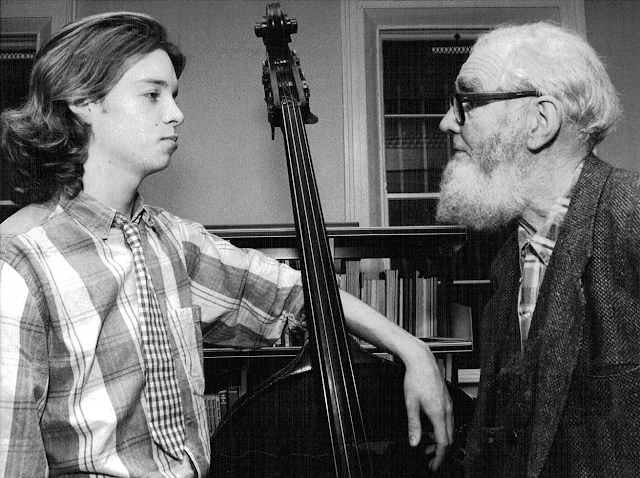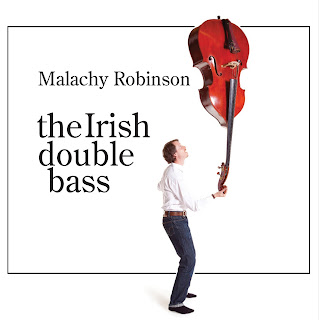The Irish Double Bass - Eoghan Desmond, Joseph Groocock, John Kinsella, Ian Wilson, Kevin O’Connell, Deirdre Gribbin, Ryan Molloy, Judith Ring; Malachy Robinson, Gary Beecher; Bandcamp
Reviewed by Robert Hugill on 24 January 2022 Star rating: (★★★★)
Irish double bass player Malachy Robinson brings together contemporary Irish music with a work by his own grandfather in this creative response to the double bass in Ireland
Malachy Robinson is the principal double bass with the Irish Chamber Orchestra as well as being an active chamber musician and performing a lot of solo double bass music. His disc, The Irish Double Bass, is something of a personal project; partly it celebrates his reaching 50, partly it is a personal odyssey including not only music by his grandfather but contemporary works that he has played and feels a connection with, and of course it was something of a lockdown project too.
So, The Irish Double Bass features Malachy Robinson alone in music by Eoghan Desmond, John Kinsella, Ian Wilson, Kevin O'Connell, Deirdre Gribbon, Ryan Molloy, and Judith Ring, plus he is joined by pianist Gary Beecher for Joseph Groocock's Sonata for Double Bass.
We being with Eoghan Desmond's Variations for Solo Double Bass. Written for the Irish Composers Collective and premiered by Robinson in 2014, the piece reflects the fact that Robinson also plays the viol and the violone, and Desmond sees the piece as a traditional set of divisions. Busy and vigorous, the imaginative writing also brings out the underlying melancholy of the instrument.
 |
| Malachy Robinson with his grandfather, Joseph Groocock in 1989 |
Joseph Groocock was Robinson's grandfather, a teacher in Dublin who also wrote Fugal Composition: A Guide to the Study of Bach’s ‘48’ and was active as organist and choirmaster. His compositions were often bespoke, written for particular people or needs. His sonata was originally for cello and written for his wife Dorene, an amateur cellist. It is deliberately Brahmsian, with a Schumann-esque lyrical, impulsive quality. The chromatic slow movement is rather intense, whilst the finale positively explodes with real Romantic drama. Robinson has produced his own edition for double bass, adjusting the registers so that Groocock's original piano part is preserved.
John Kinsella wrote Una Giga para Carlos for cellist Carlos Prieto and his Stradivarius cello which had, for a time, been owned by a Dublin family. Una Giga para Carlos is based around a jig, here heard in Robinson's version for double bass. Whilst there is an underlying dance-rhythm to the piece, what we notice is Kinsella's use of a dazzling array of techniques, all vividly played by Robinson.
Pianura was commissioned from Ian Wilson by RTÉ Lyric fm in 2004 for Robinson to perform. Wilson uses scordatura and natural harmonics to change the dark, low character of the instrument to something, quiet, high and intense and its thoughtful meanderings are always intriguing.
Kevin O'Connell's Slåttar was written for Robinson and the references a Norwegian folk dance usually played by Hardanger fiddle. O'Connell was listening to a lot of Norwegian folk music at the time, but the piece is less an evocation and more an exploration, and the result has a restlessness to it as O'Connell seems to be creating maximum variety in the textures on the instrument with all sort of adventurous techniques.
Deirdre Gribbin wrote Maps of Awakening in 2021 specifically for this disc and of course, it was written during lockdown. One of her lockdown sources of adventure were maps, and in writing it Gribbin took advantage of the fact that she has collaborated with Robinson on a number of occasions. The resulting piece seems to be about three things, timbre, texture and technique, with Gribbin challenging Robinson in the one to achieve the other two. Terrific.
Ryan Molloy's Bodhrán also began as a result of a call for works by the Irish Composers Collective, and came about after Molloy attended a workshop with Robinson. And for those unfamiliar with the word, the title refers to a drum. The work starts dark and low, and is again restless, using a myriad of dazzling techniques to striking effect.
Judith Ring wrote a five-part cello suite for Martin Johnson, called Wildwood, one movement of which was 'Twilight Lull'. Here, Robinson's arrangement of that movement is featured, a movement that Ring says 'focuses on the sense of surreal eeriness and calm that happens at twilight in a forest and is edged with the slightly ominous vibe of moving shadows and tricks of the mind.'. The result is slow and highly evocative, and with a great sense of space.
The final work on the disc is Robinson's own arrangement of the traditional song, My Lagan Love, where he sings to his own accompaniment. Pure magic.
Eoghan Desmond (b.1989) - Variations for Solo Double Bass 2014
Joseph Groocock (1913–1997) - Sonata for Double Bass and Piano 1985
John Kinsella (1932-2021) - Una Giga para Carlos 2006
Ian Wilson (b.1964) - Pianura 2004
Kevin O’Connell (b.1958) - Slåttar 1999
Deirdre Gribbin (b.1967) - Maps of Awakening 2021
Ryan Molloy (b.1983) - Bodhrán 2014
Judith Ring (b.1976) - Twilight 2018
Traditional, arr. Malachy Robinson - My Lagan Love
Malachy Robinson (double bass)
Gary Beecher (piano)
Recorded at ICO studio, Limerick in March 2021. Produced by Laoise O'Brien, engineered by Ben Rawlins. Made with the support of the Department of Tourism, Culture, Arts, Gaeltacht, Sports & Media.
Available from Bandcamp
Never miss out on future posts by following us
The blog is free, but I'd be delighted if you were to show your appreciation by buying me a coffee.
Elsewhere on this blog
- Love, jealousy, death and a wedding: Handel's Aci, Galatea e Polifemo from Orchestra of the Age of Enlightenment - concert review
- You have two ears and an opinion: artistic director Fiachra Garvey introduces this year's Classical Vauxhall festival - interview
- Decadence and refinement: Karina Canellakis conducts Scriabin's Poem of Ecstasy with the London Philharmonic Orchestra - concert review
- Winter Opera St Louis educates as it entertains - guest posting
- Pure joy: ECHO Rising Star recorder player Lucie Horsch & lutenist Thomas Dunford in music old & new - concert review
- Beyond Miss Julie: Joseph Phibbs on his opera Juliana setting Laurie Slade's updating of Strindberg - interview
- Opera scenes from the Young Artists of the National Opera Studio with the orchestra of English National Opera at Cadogan Hall - concert review
- Beauty and bleakness: Douglas Knehans' Cloud Ossuary from Brno Philharmonic Orchestra and Mikel Toms - record review
- The Art of Transformation: inspired by a Scottish Border ballad Alastair White's Woad is very much an opera for our times - record review
- A sense of ritual: Edward Jesson's Syllable, a work of complex musical theatre, is premiered by Trinity Laban Opera - opera review
- Still in cracking form: Verdi's Nabucco returns to Covent Garden - opera review
- The sense of eternity that can be found in the simple doing of something: Sven Helbig's Skills - interview
- Home


No comments:
Post a Comment